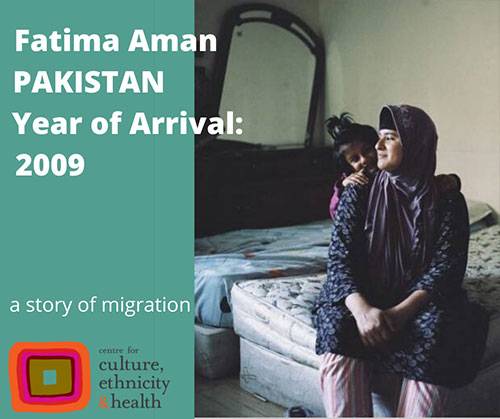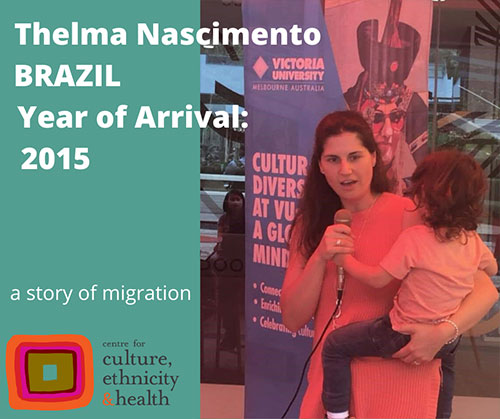Following on from last week’s refugee stories, MHSS would like to share two more stories from our community members from migrant backgrounds with similar experiences.
The stories highlight some on the issues that people face on arrival and can support us all to consider the lived experience of clients from refugee and migrant communities, asylum seekers and international students.
As service providers we need to think about the barriers that inhibit good health for all, and how best to overcome them. The removal of these impediments is particularly important when addressing the highly stigmatised and culturally sensitive topics of BBV/STI.
So, this year, let us make everyone feel WELCOME!

(Pictured: The picture I am sharing (myself and my kids), won a photography competition and stayed on the walls of National Portrait gallery Canberra for two years under the Refugees and Migrant section.)
Fatima Aman
Having little family or community support is one of the most difficult aspects of starting life in a new country. It takes time to learn a new language, new customs and making new friends. We work with people and communities to overcome these barriers and make connections and links to health services.
“When I arrived in Australia in 2009, I couldn’t speak English fluently. It was an interesting and extremely challenging journey to learn the language, make friends and start life all over again with no family and community support.
I combat racism in my own unique way by starting to learn about people around me, trying new foods and making friends. Sharing my story and educating people about my culture and my journey. Also to leave behind any biases, validating my own feelings and experiences and just enjoy. I started my educational journey and successfully gained employment in terms of getting over the isolation and social barriers. I make friends and am pleased to be able to feel like home and to raise my beautiful children in this land of opportunities (Australia).
COVID 19 is an extremely stressful experience for us as a family. I had to manage my children’s emotional and psychological needs, also the online schooling while trying to work and study from home at the same time.
Strategies that kept me grounded were; Going for long walks and keeping reminding myself to consider this lockdown time as an opportunity to get to know my family better, cook and chat with my kids also to watch movies together in the evenings.”
#digitalvoices
#RefugeeWeek
#worldrefugeeday
#yearofwelcome
#imagine
Thelma Nascimento
People seeking a better life is what unites us. Racism and prejudice is what isolates people. This prevents people from refugee and migrant communities from accessing the services we need.
We work towards celebrating differences and bringing communities together.
“As a Brazilian born whose grandparents were Portuguese, I never suffered racism due to the colour of my skin (although some people don’t believe I’m Brazilian because my skin is completely pale). I am very privileged in that. What Brazilian women suffer from here in Australia is sexism. The idea that Brazilian women are “easy”, makes men think they are entitled to our bodies.
I decided to come to Australia not only because life here is better, but also because I wanted to have kids in a place where cultural diversity is talked about and taught. So since 2018 I have been taking a number of courses related to the subject and since last year I am the Chair of Victoria University Cultural Diversity Student Network, where we bring awareness, training, events and projects to students, staff, and the community. We are now working on an anti-racism project due to the racism that Asians are suffering because of the COVID-19 and the current #BlackLivesMatter campaign.
Together with some friends, I also co-created the Victoria University Multicultural Club. We realised that there were so many different cultural clubs, but none that were effective in joining different cultures together, and that is what is needed to combat racism. The more we learn about other cultures, the more we stop relying on assumptions. Knowledge is power and that is how we can combat racism.
The pandemic can make people feel isolated, which is an added layer for those who suffer racism. Keeping connected with people you care about and care about you is extremely important to cope with this situation. Even if you feel alone and there’s no one who really cares about you, there are a great number of groups where you can find people who understand you and your situation. We are human beings and we need relationships and connection.
And above all, self-care is the best thing you can do for yourself, whatever that might look to you. If you enjoy dancing, singing, painting, colouring, drawing, writing, playing games, doing puzzles or crosswords… connect and listen to your body. It knows what you need.”

(Pictured: My little activist and I wearing orange for a Harmony Week event at VU).
GET INVOLVED
CEH’s Multicultural Health & Support Service works with communities and health professionals to address the poorer health outcomes experienced by people from refugee & migrant backgrounds, asylum seekers and mobile populations. It aims to prevent HIV, viral hepatitis and sexually transmissible infections, and offer a multicultural approach to alcohol and other drug support.
Multicultural Community Action Network (M-CAN)
M-CAN brings together members of refugee & migrant communities to help like-minded people work towards improving the sexual health of their own communities.
M-CAN For more information click here
to join M-CAN please complete this form.
